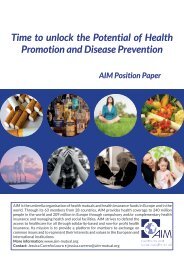Exploring patient participation in reducing health-care-related safety risks
Exploring patient participation in reducing health-care-related safety risks
Exploring patient participation in reducing health-care-related safety risks
Create successful ePaper yourself
Turn your PDF publications into a flip-book with our unique Google optimized e-Paper software.
Adverse events<br />
Respondents from the United States were asked about the occurrence of adverse events<br />
<strong>in</strong> the Commonwealth Fund Survey of Public Views of the US Health Care System<br />
2011. Thirteen per cent said that they or a family member acquired an <strong>in</strong>fection or<br />
complication as a result of medical <strong>care</strong> and 15% reported experienc<strong>in</strong>g a surgical or<br />
medical error or mistake, <strong>in</strong>clud<strong>in</strong>g <strong>in</strong>correct drug dosage or laboratory results (67).<br />
The 2008 Commonwealth Fund International Health Policy Survey of Sicker Adults<br />
was conducted <strong>in</strong> eight countries: Australia, Canada, France, Germany, the Netherlands,<br />
New Zealand, United K<strong>in</strong>gdom and United States. Patients with chronic disease<br />
who had been hospitalized <strong>in</strong> the previous two years were <strong>in</strong>cluded. Of these <strong>patient</strong>s,<br />
between 7% (France) and 18% (United States) reported that they had been readmitted to<br />
hospital or went to the emergency room because of complications dur<strong>in</strong>g recovery (68).<br />
Of all the <strong>patient</strong>s with chronic disease who participated <strong>in</strong> the survey:<br />
» 6% (the Netherlands) to 14% (United States) reported that they had been given<br />
<strong>in</strong>correct medication or doses;<br />
» 8% (United K<strong>in</strong>gdom and France) to 17% (Australia) reported a medical mistake <strong>in</strong><br />
treatment; and<br />
» 1% of those who had been subject to laboratory tests <strong>in</strong> the Netherlands to 7% <strong>in</strong><br />
Australia and the United States reported hav<strong>in</strong>g been given <strong>in</strong>correct results.<br />
Most errors <strong>in</strong> medication, treatment or laboratory test<strong>in</strong>g occurred outside the hospital.<br />
Safety management<br />
Of the hospitalized <strong>patient</strong>s <strong>in</strong> the 2008 Commonwealth Fund International Health<br />
Policy Survey of Sicker Adults, 8% (United States) to 17% (United K<strong>in</strong>gdom) reported<br />
that they had not been given <strong>in</strong>structions about symptoms and when to seek further<br />
<strong>care</strong>. Forty per cent (Canada) to 68% (France) who regularly took prescription medic<strong>in</strong>es<br />
reported that doctors or pharmacists sometimes/rarely/never reviewed and discussed all<br />
the medications they were us<strong>in</strong>g.<br />
Netherlands CQI<br />
The CQI was <strong>in</strong>troduced by the Netherlands M<strong>in</strong>istry of Health, Welfare and Sports<br />
<strong>in</strong> 2006 as the national standard for measur<strong>in</strong>g <strong>patient</strong> experiences with <strong>health</strong> <strong>care</strong><br />
providers and <strong>health</strong> plans. The CQI is a registered trademark that is owned by the<br />
Centre for Consumer Experience <strong>in</strong> Health Care, which coord<strong>in</strong>ates the development<br />
of CQI surveys and collects emerg<strong>in</strong>g data. CQI questionnaires measure <strong>patient</strong><br />
experiences rather than <strong>patient</strong> satisfaction (53). Patient experience questionnaires ask<br />
whether certa<strong>in</strong> processes and events occurred, comb<strong>in</strong>ed with questions about values<br />
and expectations with regard to <strong>health</strong> <strong>care</strong>.<br />
Currently, 22 sets of questionnaires have been developed, cover<strong>in</strong>g <strong>health</strong> and social <strong>care</strong><br />
literally from the cradle (per<strong>in</strong>atal <strong>care</strong>) to the grave (palliative <strong>care</strong>). CQI questionnaires<br />
cover services such as long-term <strong>care</strong> for older people, home <strong>care</strong>, mental <strong>health</strong> <strong>care</strong>,<br />
general practice, physiotherapy, hospital <strong>care</strong>, elective surgery, haemodialysis and<br />
Patients’ experiences and <strong>patient</strong> <strong>safety</strong><br />
127



